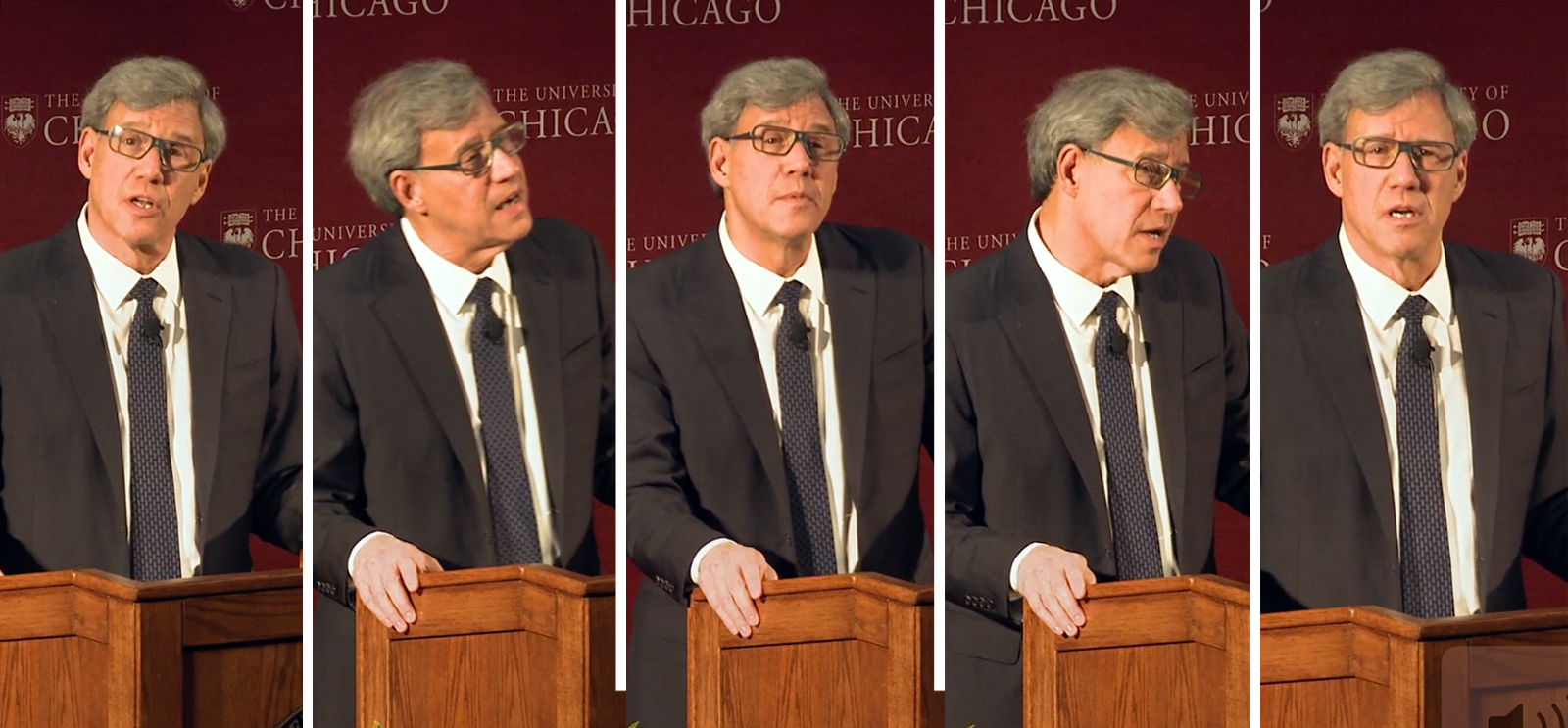
Law School professor Geoffrey Stone. (Screengrabs from his Ryerson Lecture video)
In his Nora and Edward Ryerson Lecture, Law School professor Geoffrey Stone, JD’71, explains why he thinks the Supreme Court will rule in favor of same-sex marriage.
Geoffrey Stone, JD’71, is confident he can predict the outcome of Obergefell v. Hodges, the four consolidated same-sex marriage cases on which the Supreme Court is likely to rule in June.
During his Nora and Edward Ryerson Lecture, “Sexing the Constitution: Getting to Gay Marriage?,” Stone, the Edward H. Levi Distinguished Service Professor of Law, explained that the central question of the case, which revolves around Ohio’s refusal to recognize a same-sex marriage, is whether state laws denying same-sex couples the freedom to marry violate the equal protection clause of the 14th Amendment. And “it seems almost certain that at least five justices will now take that step” toward legalizing gay marriage, he said.
The possibility that a majority of Supreme Court justices, as well as a majority of Americans, could look favorably on same-sex marriage would have been unfathomable even a few decades ago, Stone noted. However, increased visibility of gays and lesbians in America—from the Stonewall riots to the AIDS crisis to Ellen DeGeneres coming out on television—shifted American’s attitudes toward homosexuality. “This transformation affected not only everyday citizens but also legislators, mayors, governors, presidents, judges, and justices of the Supreme Court,” said Stone. “With these changes, the traditional judicial understanding of such fundamental legal concepts as liberty, equality, and due process as applied to homosexuals was suddenly called into question.”
In 1986 the Supreme Court upheld Georgia’s antisodomy laws in the case Bowers v. Hardwick. In 2013, the court ruled in United States v. Windsor that a federal definition of marriage as a man and a woman is unconstitutional. In the two years since Windsor, an overwhelming majority of lower courts have begun to decide that laws banning same-sex marriage are unconstitutional. “The shift has been sudden, and it has been seismic,” said Stone.
During the lecture, Stone made his personal views on the issue clear. He had to hold back emotion while recalling Justice Anthony Kennedy’s announcement of the majority decision in the 2003 case Lawrence v. Texas, which invalidated all remaining antisodomy laws in the country. And he proudly told a story about helping his then wife affix a pink gay pride pin to the American flag displayed in the Supreme Court chambers in the 1970s (“To the best of my knowledge, it’s still there,” he said).
However, Stone sees a clear legal case, and precedent, for overturning state bans on gay marriage. There are several valid arguments against the bans, but the most compelling, he said, would be to compare laws that discriminate against gays and lesbians to laws that discriminate based on race or gender, which have largely been deemed unconstitutional under the 14th Amendment.
Stone also noted that Justice Kennedy, often the “swing vote” in Supreme Court cases, wrote the majority decision not only in Lawrence but also in Windsor and in the 1996 case Romer v. Evans, which ruled unconstitutional an amendment to the Colorado state constitution that prohibited protected status on the basis of sexual orientation. “This will be his legacy,” said Stone during a question-and-answer session. “I think people who know Kennedy and understand his views about these issues are almost as confident about his voting as they are about Ginsburg and Kagan and Sotomayor and Breyer.”
Overturning bans on same-sex marriage would leave America with “an intriguing challenge,” said Stone, referencing the recent controversies over religious freedom bills in Indiana and Arkansas. If or when same-sex marriage becomes legal across the country, the courts will have to decide whether and to what extent religious objectors, from priests to wedding-cake bakers, can refuse service to same-sex couples. “These are not easy questions for one who values both the separation of church and state and the freedom of religion as I do,” he said. “But those, happily, are questions for another day.”
Audio
In the 2015 Nora and Edward Ryerson Lecture, Geoffrey Stone, JD’71, explores historical attitudes toward homosexuality, how laws discriminating against homosexuals first came to be seen as raising possible constitutional questions, and how the nation’s highest court has come to the threshold of recognizing a constitutional right of same-sex couples to marry.
